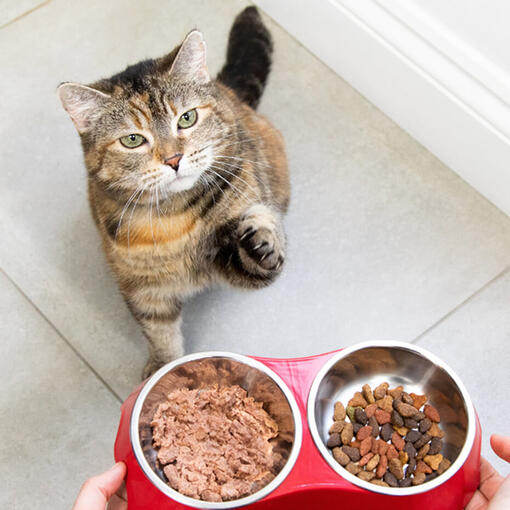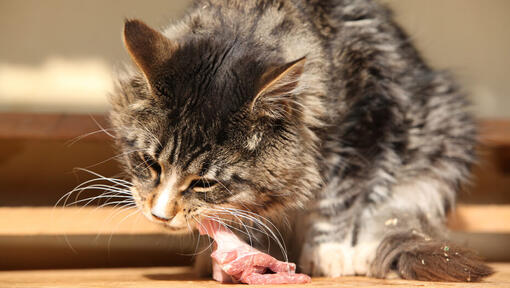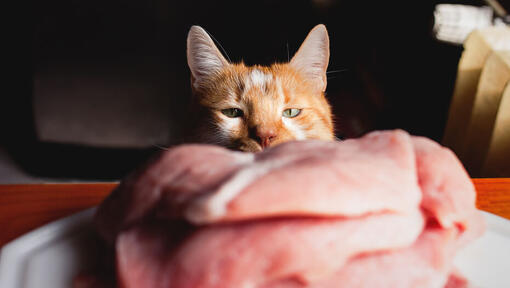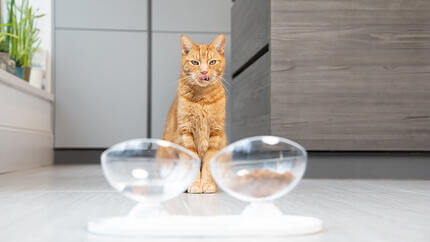
While the debate is still raging on whether we should feed our feline friends raw chicken or not, we’ve put together a quick guide looking at the benefits and the risks of feeding your cat raw meat.
Raw diet for cats is a controversial topic. With benefits and drawbacks on both sides of the argument, there is no wonder specialists are yet to find the definitive answer to the question of whether should cats eat raw chicken or indeed any other raw meat. Here is what you need to know about the pros and cons of this type of diet.
Can cats eat raw chicken?
Yes, cats can eat raw chicken. Supporters of raw diets for cats usually mention that such meal options allow the cat to consume the food felines are biologically prepared to digest. After all, no one is cooking the rodent a wild cat just caught for dinner. Some people claim that the main draw of feeding raw meat to your cat is that it mimics the meal cats are evolutionarily designed to thrive on.
However, there are important differences between wild cats like lions and tigers, and domesticated cat breeds. Perhaps the more important question to answer is ‘should cats eat raw chicken or any other type of raw meat’. For this, we need to look at what the safety risks are for both our pets and ourselves.
What are the risks of a raw diet for cats?
Although it doesn’t hurt to feed your cat raw meat, there are safety risks to consider as well.
Parasites and bacteria
Both cats and humans can get sick as a result of contamination from the parasites and bacteria living in raw meat. However, cats have a much shorter digestive tract and higher levels of acidity in their stomach than humans, making it less likely for pathogens or parasites to spend enough time in the cat’s system to make them sick.
Decrease the risk of contamination by buying fresh raw meat, disinfecting all the surfaces that have come in contact with the raw meat and thoroughly washing your hands or wearing gloves when handling it.
Nutritional deficiency
Raw chicken recipes made at home are less likely to have complete and balanced portions of nutrients, and thus increasing the risk of various nutrient deficiencies for your cat.
However, with a good knowledge of what nutrients a cat needs, a more balanced diet is possible. Find out more about how to feed your cat a balanced diet with our article.
Keep in mind that commercially available, reputable cat food based on raw meat might be a better option. This is specifically formulated by pet nutritionists to meet the needs of your pet and is constantly tested to make sure they meet safety standards.
Bone pieces can be dangerous
Small bone pieces can end up in your cat’s raw chicken dinner and pose a threat if they become lodged in the digestive tract. Cooked bones are also considered dangerous as these can splinter once swallowed and can cause internal damage.
Take these risks into consideration and make sure you consult the vet before feeding your cat raw chicken or any other type of raw meat.
Can cats eat raw chicken safely?
Despite the various drawbacks of raw meat diets, fortunately there are many ways to make this a safer choice for both you and your cat. Here are a few tips:
- Choose fresh meat from a reliable source.
- Wash your hands after handling raw meat or use gloves and dispose safely of them once done.
- Disinfect surfaces and food bowls that have been in contact with raw meat.
- Keep raw meat in the freezer, tightly sealed to avoid cross-contamination.
Can cats eat raw bacon?
Yes, cats can eat raw bacon, but always consult the vet before feeding your cat any type of raw meat. Make sure the bacon is fresh, raw not cured and keep surfaces and kitchen utensils clean after they’ve been in contact with the raw bacon.
However, bacon tends to be high in salt and fat, so it’s best to use it as an occasional treat rather than a staple food in your cat’s diet.
Even though cats can eat raw meat, it doesn’t necessarily mean they have to. There are pros and cons to feeding your feline raw meat which is why it’s important to look at both sides of the debate before deciding what is best for your pet. Consult with the vet as well to get specialist advice before making up your mind.
Next, find out our top tips for cat snacks and treats, including which ones to choose, how many should your cat have per day and what are some of the most toxic foods that can be easily confused for cat treats.













